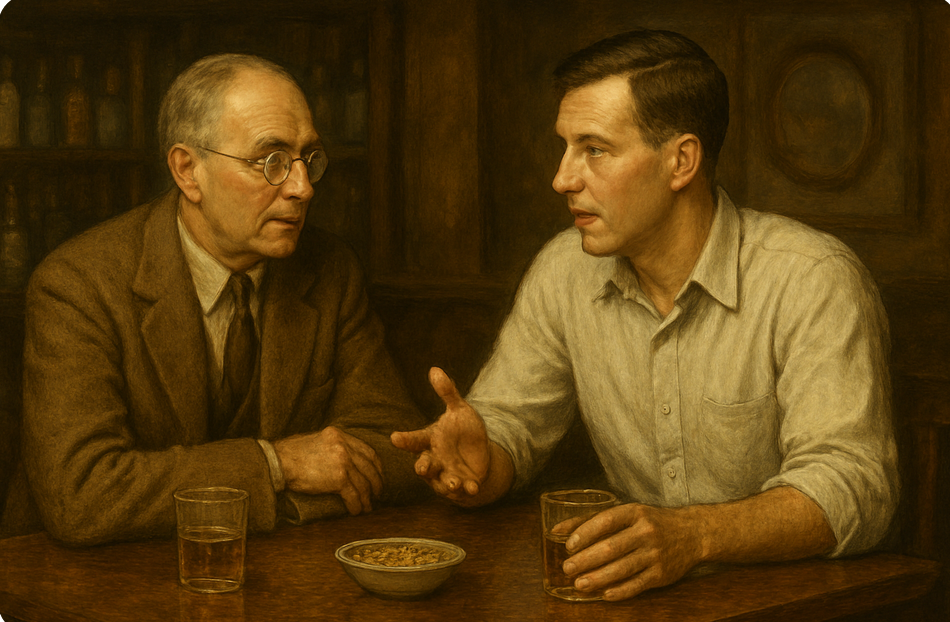Wisdom Weekend Retreats for early 2025. From Tom Morris:
15 years ago, I did retreats on Wrightsville Beach, NC near my home that brought to a comfortable resort great people who had read some of my books or heard me speak to a corporate group or big convention and wanted a weekend rather than just an hour or two to ponder the insights of the ages on things that matter. The retreats we held were amazing experiences for everyone involved, from Fortune 500 and 100 CEOs to college students, Washington lawyers, medical doctors, retired folks, and business founders. Participants from around the country got along famously, loved meeting fellow seekers of wisdom, and enlightened each another with deeper insights on the life and work perspectives we all need.
I’ve just started up the retreats again. If you are interested in actionable philosophy and deep practical wisdom, hearing new ideas on life, and enjoy a great beach, I’d love to host you at a new Wisdom Weekend. We had our first retreat in this new cycle on January 31-February 2, The Extraordinary Life Retreat. We’ll repeat that retreat on March 14-16, and then on April 4-6, we’ll do The Gift of Uncertainty Retreat. March 14-16, like our first, will be focused on true success, real happiness, and transformative change in our lives. The April Retreat will be a deep dive on navigating all the uncertainty of our day, based in the wisdom of the great philosophers. Some sample testimonials from the first retreat are below.
We’ll be diving deep into life and leadership wisdom with many great people already registered, including CEOs, presidents, directors, authors (one an author of a Forbes designated “Five Must Reads of the Year” book, a former CFO and recently retired leader of the FBI’s counter terrorism SWAT team, and lots of other fascinating people, including physicians, Morehead-Cain Scholars, and a prominent AI founder. For more, go to http://www.TomVMorris.com/retreats. If you’d like to come this year, email me ASAP at TomVMorris@aol.com, the world’s oldest email, as there will typically be only 15-25 spaces in each retreat, give or take. Our great resort hotel, recently renovated to have the aura of a high-end beach house, Lumina on Wrightsville Beach, is offering crazy low water view room prices for all attendees and is a place you’ll love. Retreat registration fees will be only $975 per person, rooms at the resort will be around $179 a night, depending on sound view or ocean view (2 nights needed for out-of-towners) and food is reasonable and very good. If you’d like to come, I’ll send final information for hotel discounts and our registration, along with other details. And bring a spouse or a friend or colleague!
Retreats will start on the respective Friday evening at 6:30PM, will go to 8 or 8:30 and will continue in sessions on Saturday 9AM to 12 Noon, with a great beach time break and 2 PM to 5 PM, then reconvene for more informal conversations Saturday evening. We’ll conclude with a session Sunday morning 8 AM to 11, then we'll all exchange contact information with our new favorite people, hug, and depart. Wilmington International Airport (ILM) is about 10 miles from the hotel and Uber, Lift, and cabs are available in abundance. We have direct flights many times a day with American, Delta, and United, among other domestic airlines. And of course, Myrtle Beach and RDU have airports within a 2-hour drive. Come and meet amazing people, enjoy deep dives into wisdom, and expand your community across space and time in a way that will support your growth for years to come.
A Sample of Recent 2025 Testimonials
The first word that comes to mind when thinking about my experience at the “Extraordinary Life” retreat led by Tom Morris is WOW - truly an extraordinary weekend with a group of extraordinary people (and now, new friends). It’s not often enough that we allow ourselves time to focus on topics that are of the utmost importance – happiness, handling change, personal growth – this is the perfect opportunity to give yourself that gift. Tom’s passion and energy as he dives into each of these topics (and more) is infectious. I walked away from the weekend feeling energized and empowered. And as an added perk, it all takes place at Lumina on Wrightsville Beach, NC which is so beautiful and serene. I HIGHLY recommend treating yourself to this experience!
- Debbie Reilly, New Jersey CPA
The Wisdom Retreat was a rare opportunity to spend time with interesting, engaging people while discussing and learning about ancient and modern philosophers. Studying the concepts of wisdom and happiness over history gives perspective to a modern life and current challenges facing each of us. Tom is knowledgeable, filled with passion, and endlessly curious about melding the great Philosophers into everyday life. We will be repeat customers!
- Bob Reilly, Licensed Professional Counselor, former FBI Special Agent, former CPA, current outdoorsman, New Jersey
Tom Morris brings excitement and energy to one’s soul and heart by exploring age-old philosophies of wisdom, happiness, and true success in life.
- Mike Priddy, Former Superintendent in larger urban North Carolina school districts, Distinguished Alumnus, UNC-Chapel Hill, and recipient of the state’s highest honor, The Order of the Long Leaf Pine.
The Wisdom retreat was a tremendous success, led by Tom Morris. Tom is an excellent speaker who engages the audience while presenting deep knowledge to the attendees. The retreat was well worth the time to not only enjoy Tom's information, but having deep conversations during breaks, lunch, dinner, and later in the evening. The quality of the people who attended raised the collective consciousness of everyone. I wholeheartedly endorse these retreats for anyone who wants to dive deeper into philosophy, psychology, and personal growth.
- Bill Bruner, Former actor, current President, theatre and theatrical company, Colorado, and author of the multi-award-winning blog, “Journey to Joy.”
Since the completion of the retreat, we have had more energy, we’ve been more oriented toward a purpose, and we’ve been doing some of the things we’ve been wanting to do for a very long time! You model for everyone how to be truly present for another person—your listening, your centeredness, your focus, and your kindness when we were all talking about a huge range of topics. Now we all know why you were raving about The Lumina Resort. We’ve never been to a more welcoming place! Incredible staff and unusually beautiful décor throughout! Such a happy place!!!
- Dorrie Gibson, UNC grad, got her teacher training at the College of Charleston and taught biology. She’s done volunteer work in the schools, community and church in North Charleston.
Tom Morris’s course is a stellar opportunity that transforms the wisdom of ancient philosophers into practical, applicable insights that anyone—at any stage of their career or life—can benefit from. Packed with witty anecdotes, thought-provoking case studies, and deep explorations of leading philosophers, it offers a roadmap for building a fulfilling life and leadership journey rooted in joy, wisdom, and peace.
- Rotimi Kukoyi, Morehead-Cain Scholar, UNC in Health Policy Management, Biology, and Chemistry. One of the youngest Jeopardy! champions in show history, for both Alex Trebek and Ken Jennings.
I highly recommend The Wisdom Weekend Retreat. If you are looking for ways to become more aware that life is a meaningful journey, this is a big and significant step in the right direction!!! This was my first Wisdom Weekend Retreat, and I hope to attend many more.
- Jack Gibson, retired physician, North Charleston, SC
And Finally: My new wisdom friend Dawn Epstein began reading my work while a student a Harvard and just came to one of my new Wisdom Weekend Retreats and posted this online:
<<So, I'm still buzzing with energy from last weekend's remarkable retreat with Tom Morris (and also: psychologist Gary Bradt)! I am not new to Tom's work, having many of his books, but this weekend spent in the company of a wide range of accomplished people of all ages really helped me pull his ideas together and make them actionable. In the informal, open environment Tom created--enhanced by glorious views of the beach outside--attendees were able to ask and discuss questions and share perspectives. I learned as much from fellow attendees as I learned from the excellent and generous presenters. I’d recommend this retreat to anyone looking for deep, philosophically grounded conversation or practical methods for (re)invigorating one’s life work during these challenging times. I think my most actionable take-away was an insight that led to a new direction of study that may revive my own (shelved) manuscript on protecting ourselves from unethical images. But I also felt refreshed in the knowledge that there are plenty of deeply principled, kind, and accomplished people of all ages and walks of life who want to do better by others in their passage through this world. I’m looking forward to returning in April. And I'd love to have your company walking on this 7-mile stretch of beach!>>































